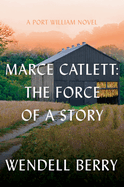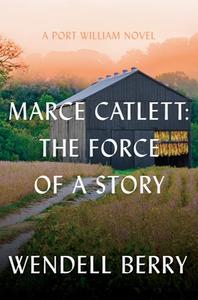
 Wendell Berry (The Need to Be Whole; Jayber Crow) has never hidden behind his stories; the land and people of Port William, Ky., have always been his land and his people. This truth is perhaps never more obvious than in Marce Catlett, where an elderly Andy Catlett looks back along the long line of his life and that of his father and grandfather, to the story that "has held them together like a living root of the same tree."
Wendell Berry (The Need to Be Whole; Jayber Crow) has never hidden behind his stories; the land and people of Port William, Ky., have always been his land and his people. This truth is perhaps never more obvious than in Marce Catlett, where an elderly Andy Catlett looks back along the long line of his life and that of his father and grandfather, to the story that "has held them together like a living root of the same tree."
The story is of their 1906 tobacco crop--of Marce Catlett's long, slow trip to Louisville, where their tobacco will be sold. Every detail is captured, the story's pace as deliberate as the steps of Marce's horse in the dark and as quiet as Marce's neighbor and companion, Jim Stedman: "he said little, thought a lot, watched, listened, and was unsurprised, perhaps by then unsurprisable." Perhaps neither man is surprised when the auction's sole buyer pays mere pennies on the pound, leaving them unable even to cover the cost of its sale by the proceeds. "Its purchase, properly named, was theft." Berry titles this first section "The Past," and the remaining section "The Future," but the story of that 1906 crop lives ever-present in Andy Catlett's life.
Andy Catlett's life mirrors Berry's own: his lawyer father, his love of books, his departure from and sure return to the Kentucky landscape that captured his heart in youth, among other details. And in this title's final pages, Berry's own voice, honed in countless essays on the agrarian life and principles he honors, overshadows that of Andy Catlett. At times, it is nearly strident, a bitter mourning for a life destroyed by "the all-out industrialization of rural America," employing methods he calls "new kinds of mining: maximum production at minimal expense, extraction without maintenance or any return of care." At others, Berry offers a tender archiving of that care, detailing the long year's work of raising and bringing in a tobacco harvest, calling it "beautiful at every step and stage" and noting that "No other crop demanded such continuous attention over so long a time... such artistry of management and handling." So when Andy "prays his benediction and farewell" near the book's close, readers will also hear that of Berry; "his requiem" not for "the cellar, the smokehouse, the hen house, the garden," but for "the way that once lived among them, the paths worn and wearing day by day, that connected them during a lifetime to one man's effort and desire." --Sara Beth West, freelance reviewer and librarian
Shelf Talker: Wendell Berry returns to his beloved Port William, offering a kind of benediction full of longing for a former life threaded with wonder at its beauty and its humble persistence.

